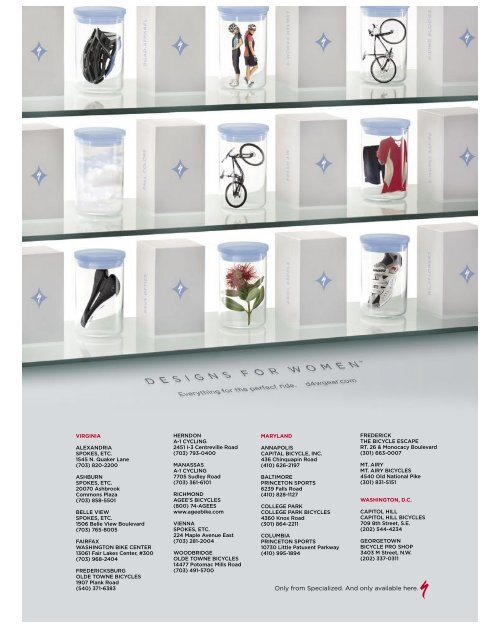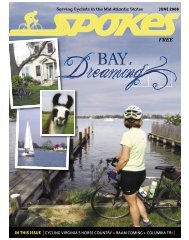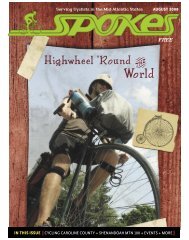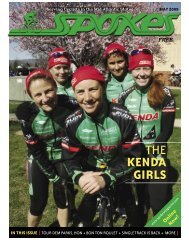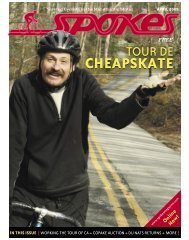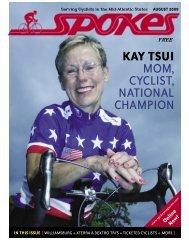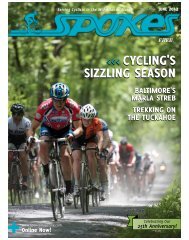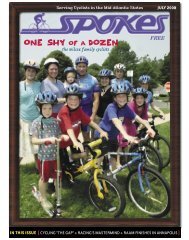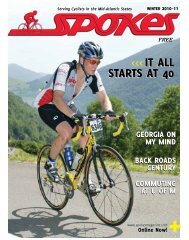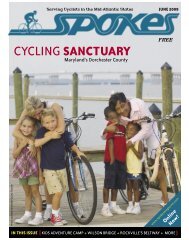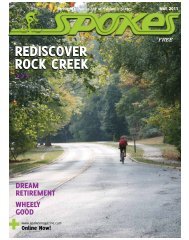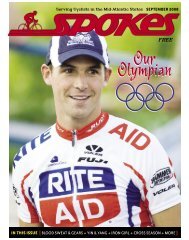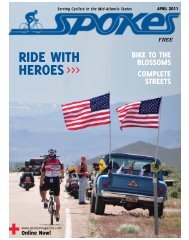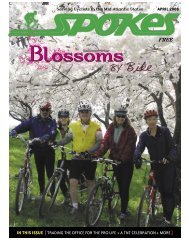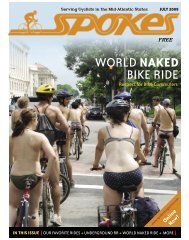Race Across America? - Spokes Magazine
Race Across America? - Spokes Magazine
Race Across America? - Spokes Magazine
Create successful ePaper yourself
Turn your PDF publications into a flip-book with our unique Google optimized e-Paper software.
COLUMNS<br />
SPOKESWOMEN by ANNE MADER<br />
…a look at women’s cycling issues in the<br />
mid-Atlantic<br />
A Holistic Approach to Bike Fit.<br />
In mid-April I went to a two day bike fitting seminar<br />
put on by Michael Sylvester from Trek University. I<br />
have been to a number of seminars on bike fittings<br />
and while each seminar has been a little different<br />
they have focused primarily on using body measurements<br />
and angles to determine the best size and set<br />
up for a person’s bike. This is a good method to use<br />
and we have used it successfully for a long time in our<br />
shop to fit numerous people on road, mountain, and<br />
triathlon bikes.<br />
However the fundamental fitting techniques we<br />
learned in the Trek Bike Fit seminar were different.<br />
For instance, instead of learning about the proper<br />
geometry of the body while on the bike we learned to<br />
first look at the individual off of the bike. From this<br />
and a lot of the right questions, we learned to determine<br />
how the bike should fit the individual’s body<br />
instead of making the body fit the bike.<br />
We spent a lot of time doing yoga which focused on<br />
good body alignment and range of motion. We also<br />
spent a lot of time learning about the biomechanics<br />
of the body and how an individual’s riding style,<br />
anatomy, flexibility, and range of motion should be<br />
the basis of how they are fit to a bike.<br />
By the end of the two days everyone had the opportunity<br />
to use this knowledge to assess and fit each other<br />
to their individual bikes. For many it was surprising to<br />
see the modifications made to their bikes. Seats were<br />
raised or lowered, stems were swapped out for various<br />
lengths and angles, and fore and aft saddle positions<br />
were changed.<br />
On my bike, we lowered my saddle about 1⁄2 inch<br />
and lengthened and lowered my stem. We also<br />
noticed that I hunch my shoulders when I ride and<br />
we worked on relaxing and opening up my chest<br />
in order to breathe better. To help I learned yoga<br />
exercises that would help me maintain strength and<br />
increase my flexibility.<br />
I have very long legs and hardly a torso to speak of.<br />
I am constantly raising my saddle and shortening my<br />
reach to the handle bars by using short stems. I am<br />
so used to making these adjustments that when I get<br />
a new bike I automatically swap everything out and<br />
raise my saddle without having anyone properly fit<br />
me. And I like the way my current bikes fit, or at least<br />
I thought I did. So, I was pretty skeptical of the new<br />
adjustments that we made but I figured I would give<br />
them a shot.<br />
The day after the seminar I took my newly adjusted<br />
bike out for a spirited three hour road ride with<br />
some friends. Throughout the ride I was aware of<br />
my positioning on the bike, trying not to hunch over<br />
and I properly stretched after the ride (which I don’t<br />
do often enough). I was amazed at the difference.<br />
During the ride I could climb easier, descend better,<br />
and I lasted an hour longer than I thought I would.<br />
And the next day my legs felt fresh and recovered! It<br />
was a huge improvement.<br />
So, why did these changes make such a difference?<br />
And why had I not noticed that my bike was not properly<br />
fit? Thinking back it is easy to see how my bike<br />
fit got so screwed up. As a shop owner, I have been<br />
telling people how important it is to get properly fit<br />
for a bike but I forgot to do it for myself. I figured I<br />
had been fit once or twice and knew enough about<br />
my body that I didn’t need anyone assessing my fit. Of<br />
course, that was seven years ago and I have had two<br />
children since then. Due to yoga and regular stretching<br />
I am also more flexible than I was but I have a<br />
few more injuries. And my reasons for riding have<br />
changed as well. Instead of focusing on short fast<br />
races I have begun to enjoy long endurance racing.<br />
Which means my training rides and my races are longer.<br />
So, not only has my body changed over the years<br />
but my riding style has too. So, it makes sense that I<br />
should be positioned differently on my bike.<br />
So what I learned was this; when trying to get the<br />
proper fit on a bike it is easy to get caught up in measurements<br />
and angles but we need to remember to<br />
take our entire physiology into account and look at<br />
the whole picture.<br />
When working with a bike fitter make sure the fitter<br />
has an understanding of your riding style, physiology,<br />
flexibility, riding history, etc. Make sure you tell them<br />
about any injuries or health conditions you have and<br />
tell them about any concerns you have with your<br />
current bike position. And be open-minded to<br />
changes. Your new bike position may feel different at<br />
first but you might be surprised at the benefits of a<br />
few little changes.<br />
PERRY NAMED DIRECTOR OF BIKEWALK VIRGINIA<br />
BikeWalk Virginia announced<br />
on March 25 that Kimberly<br />
Likens Perry, Ed.D. has been<br />
named Executive Director for<br />
the state-wide advocacy and<br />
education organization effective<br />
March 31. Dr. Perry will succeed<br />
Allen Turnbull, Ph.D. the<br />
founder of BikeWalk Virginia,<br />
who announced in 2007 his<br />
desire to step down in order to<br />
pursue new opportunities.<br />
Perry was previously Dean<br />
and Director of the Bon Secours School of Medical Imaging<br />
in Richmond, a position she held for eight years. She earned<br />
a Bachelor of Science degree in Vocational and Technical<br />
Education and a Master of Science in Education degree in<br />
Health Promotion from Virginia Tech University in Blacksburg,<br />
Virginia. She also earned a Doctor of Education degree in<br />
Educational Leadership from the University of Phoenix.<br />
Perry’s personal interests are well-aligned with the BikeWalk<br />
Virginia’s underlying mission. She is an avid cyclist and water<br />
sports enthusiast who participates in a wide variety of outdoor<br />
recreation across Virginia. She also serves as Vice President of<br />
the Richmond Area Mid-Atlantic Off Road Enthusiasts Cycling<br />
Organization, co-leader of Mountain Bike Kids in Richmond,<br />
and was a Cycling Merit Badge Counselor for the Boy Scouts of<br />
<strong>America</strong>.<br />
“We feel very confident that Kimberly is the right person to<br />
lead BikeWalk Virginia at this important time in the organization’s<br />
development,” said Richard Elder, BikeWalk Virginia<br />
Board of Directors Chair. “She has a personal passion for<br />
cycling, a track record of building community-based organiza-<br />
tions, and a ‘can-do’ attitude that will help drive BikeWalk<br />
Virginia’s continued growth.”<br />
“This is also an important moment to recognize and thank Allen<br />
Turnbull for his vision and leadership over the past 20 years.”<br />
Elder continued. “Allen is widely recognized across the state as<br />
a passionate and resourceful advocate, not only for biking and<br />
walking, but also for the importance of building communities<br />
that encourage active lifestyles. We wish Allen the best in his<br />
new pursuits.”<br />
BikeWalk Virginia was founded as a 501 (c)(3) organization in<br />
2000. Originating in 1988 as a bicycling event, BikeWalk Virginia<br />
continues to organize nationally recognized Bike Virginia rides<br />
to fund education and advocacy work for non-motorized transportation<br />
safety and access. BikeWalk Virginia holds an annual<br />
conference as a forum for legislators, planners, educators and<br />
advocates on key issues critical to pedestrians and cyclists.<br />
In 2004, the Virginia Trails Association joined BikeWalk. The<br />
group’s mission was broadened to include on and off road riders,<br />
hikers, kayakers, canoeists, and equestrians.<br />
BikeWalk Virginia members and chapters keep in touch with<br />
local issues and provide local policymakers and planners<br />
with information on best practices from around the county.<br />
They are helping communities make changes to become more<br />
bicycle and pedestrian friendly. BikeWalk Virginia chapters<br />
have formed in the Alexandria, Roanoke, New River Valley,<br />
Fredericksburg, and Northern New areas. New chapters are<br />
forming in Norfolk, Central Shenandoah Valley, and Middle<br />
Peninsula.<br />
To follow national, state, and local issues affecting non-motorized<br />
transportation and to work with BikeWalk Virginia to<br />
improve recreation and transportation options for Virginians<br />
and visitors to Virginians, visit www.bikewalkvirginia.org to<br />
become an individual or business member or sponsor.<br />
22 May 2008


